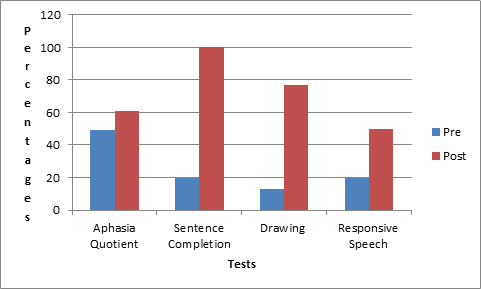Age: 45
Time since stroke: 7 months
Chad was a young, married man with three children and aphasia. A former small business owner before his stroke, he wasn't sure what he wanted to do with his life now. He didn't consider himself disabled and had no fears of speaking with others or being in public. His goals were to use his email, communicate better with his friends and family, improve his writing and speech and coach his son's football team.
Problems:
- Spoke in 1-2 words at a time, but not always helpful speech
- Poor comprehension—he was not aware of his comprehension problems
- Wanted to read and write emails and texts but had little reading and writing
- repeated some words, such as "everything" and "long" as a response
Assessment: He pretended to understand what was being said to him, but often responded by naming his children or saying "What's your name?" when he needed something to be repeated. A typical response to a question was "everything". He did not consistently use gesture, writing, or drawing to help him communicate. He could pick out a few words reading email, but could not operate email or write anything.
Treatment:6-week program recommended
 Select Sub-test Results.
Select Sub-test Results.Results: By the end of his six weeks, he consistently spoke in 2-4 word utterances, although he could say longer sentences with reminders to start with "I" or the subject. Family and friends noted that he used more words when speaking and that he understood more. An example sentences is "I don't know what to talk about".
He used his iPad to search for information to help him communicate what he couldn't say. He wrote single words with 90-100% accuracy during conversation. He used writing, drawing, and his iPad to communicate information during conversation, such as "What did you do over the weekend?", or to tell us that he bought a new house. He indicated that he understood conversation more frequently and gave correct responses to a variety of topics.